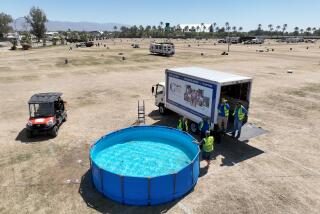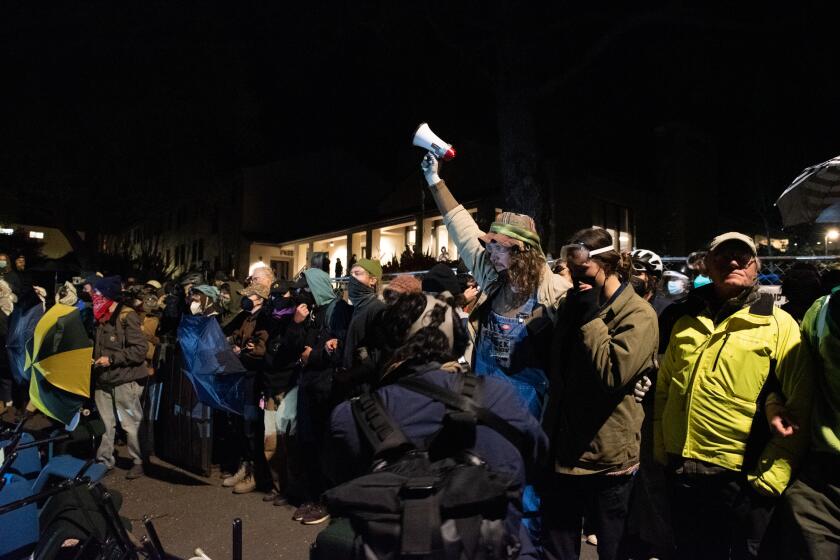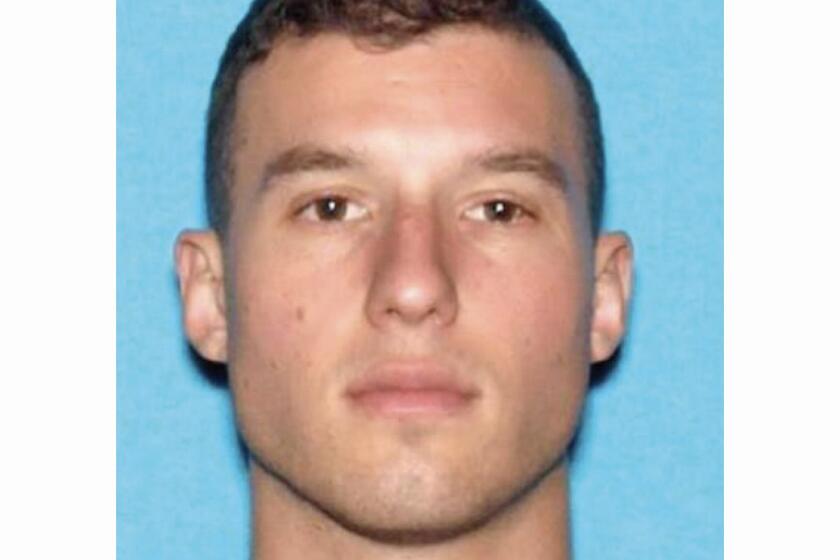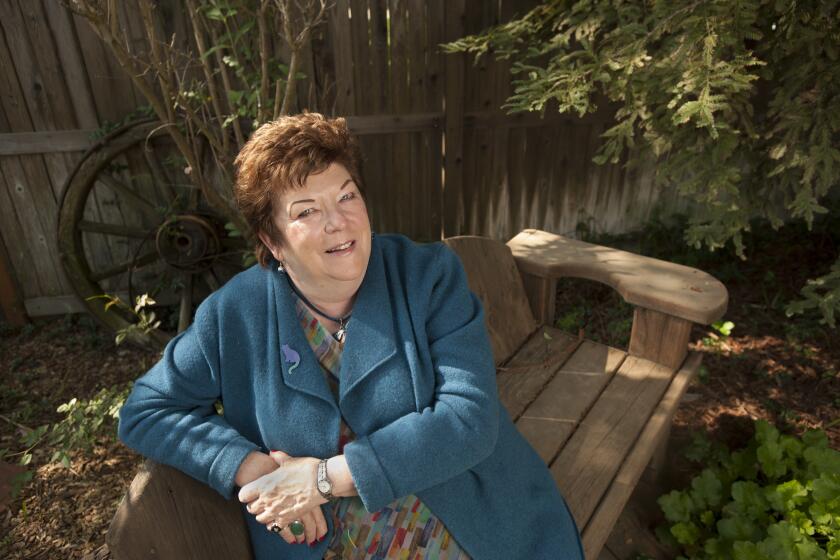Smart talk from the ‘sex ed girl’
Andreina Cordova has a 15-minute window to change a life, just a few moments between the dismissal of classes and the beginning of soccer practice.
She wants to speak to anyone who will listen -- about making smart decisions about sex.
She plunges into the throng of students on the sidewalk outside King/Drew Magnet High School of Science and Medicine.
She has memorized pages and pages of information on sex education and sexually transmitted diseases. She’s ready to pass out cards from Planned Parenthood, listing services and clinics. She is also armed with condoms.
Andreina is 15. She’s been attending Planned Parenthood sex education events since the age of 13. She had just finished eighth grade when she became one of the youngest students ever hired to be a peer advocate in a program whose goal is to reduce teen pregnancy and STD rates.
And that may be why some of the kids at school assume certain things about Andreina.
“People are like, just because she does this peer counseling, she is going to have sex like that,” said Bryanna Rivera, who is also 15 and a friend.
But they don’t know Andreina.
Popular culture works against anyone trying to push safe sex or abstinence. Sexually charged advertising floods TV; MySpace and Facebook are saturated with come-ons from and for adolescents. Thanks to the tabloids, updates on 17-year-old Jamie Lynn Spears’ pregnancy appear almost daily.
More than 360,000 adolescents contract a sexually transmitted disease each year in Los Angeles County. In 2005, the most recent year for which data is available, 5,113 L.A. County girls younger than 18 gave birth -- 3.4% of all births that year.
Andreina does her outreach at the epicenter of the crisis, South L.A., which has the county’s highest percentage of teen births and rates of sexually transmitted diseases, according to the county’s Department of Public Health.
The statistics aren’t just numbers to Andreina; they represent the teenagers sitting next to her in class, on the school bus, at her house.
“These are people that I know,” Andreina said.
Asked why a 15-year-old would risk insults, humiliation and rejection to counsel peers on birth control and STDs, Andreina summons the memory of a middle-school classmate who became pregnant and dropped out.
A few weeks after her classmate left school, Andreina attended her first safe-sex awareness event hosted by Planned Parenthood.
She quickly understood her goal: to educate teenagers on how to make wise decisions.
“I mean, I was in middle school. They don’t teach you a lot about sex there,” Andreina said.
But first she had one large hurdle to clear: her parents.
Cars pack the driveway of Andreina’s house in Paramount on a Sunday morning.
Inside, three generations of Cordova women gather along with Andreina’s father, Andres, 50. The conversation among the Salvadoran American family alternates between English and Spanish.
Andreina, whom the family calls “Gina,” is the youngest of five sisters; four still live with their parents and maternal grandmother, Carmen. All the sisters are in high school or college, and four of them, including Andreina, want to work in healthcare.
Though the sisters regard their parents as traditional, Roman Catholic and strict, both Andres and his wife, Ana Lillian, 49, demur.
The couple dated for a few years and moved in together in 1982, but didn’t marry in a civil ceremony until the quinceanera of their first daughter, Jaime, in 1997. It wasn’t until their next daughter, Cynthia, had her quinceanera the next year that the two married in the Catholic Church.
“Our parents wanted us to get married,” Ana Lillian said. “We didn’t see the need for a little piece of paper.”
But perspective is everything. Ana Lillian and Andres are now the parents of five daughters who want to stay out late with friends or dates.
“My white friends still laugh when I tell them that I have to let my dad know if I’ll be home late,” Jaime, 25, said.
“I’m responsible for them as long as they live under this roof,” Andres said. “I just want to be in the loop.”
The parent-teenager dance is one that Andreina has learned by watching her sisters grow up.
When she asked to attend her first Planned Parenthood event, Andreina said, “my parents at first didn’t know what I was doing.”
So when Andres said yes, her sisters were shocked.
But Andres explained: “My parents never talked to me about sex. So many of us back in El Salvador just had to figure out things on our own, from our friends usually.”
Now Ana Lillian frequently drives her youngest to Planned Parenthood outreach events.
On the day before school closed for a three-week break, Andreina stopped about 12 students on the campus’ sidewalks. The girls seemed receptive; the boys, amused.
She briefly spoke with two classmates. The 16-year-old boys listened intently, their grins fading as she rattled off a list of STDs to watch out for. They asked about the symptoms of chlamydia -- pain during urination or in the groin area -- with one of them adding: “Can you keep this private?”
Andreina nodded.
“You know where to find me if you have more questions,” she added.
Andreina’s work is anchored in Planned Parenthood’s Ujima Program, which preaches more abstinence and less sex. At least “until you know what you’re getting into and the consequences,” Andreina said.
The program was launched in 2002 after research indicated that teens were more likely to feel comfortable discussing sex with peers instead of parents, said Mary-Jane Wagle, president and chief executive of Planned Parenthood Los Angeles.
Andreina “understands the experience of teens in her area, she has lived there, and she understands what they are going through,” Wagle said. “Her knowing all that firsthand gives her authority to be a leader and get people to listen.”
All peer advocates undergo three days of training and must pass a test before they are hired into the program. Andreina and the other participants meet once a week in a small clinic in South L.A. to discuss safe-sex issues and coordinate events.
She’s learned how to work within the guidelines set by school administrators, who asked her not to distribute condoms on campus but did allow her to leave them in the nurse’s office.
But those who know Andreina only as the “sex ed girl,” as her friend Bryanna puts it, don’t understand the woman she’s working to become.
On school days, Andreina wakes up no later than 6 a.m. to make the 30- to 45-minute commute to King/Drew. She goes through a full day, always missing lunch on Wednesdays to attend two club meetings for 15 minutes each.
A glance at her schedule shows an extracurricular activity planned every day after school: a community service club, the Planned Parenthood peer meeting, soccer practice, the school newspaper. She gets home around 7 p.m., has dinner and hits the books until bedtime around 10:30, hoping to raise her only B, in geometry, to an A. Later in the semester, when soccer season ends, she’ll fill her schedule with art club, guitar lessons and salsa classes.
On weekends, it’s “all homework, 24-7,” she said with a smirk, sitting cross-legged on her bed one Sunday afternoon.
“I’m always trying to get her to hang out, but she’s too busy trying to save the world,” her sister Jennifer, 16, a junior at Paramount High School, lamented in the doorway to her room.
Andreina’s eagerness to engage in discussions about safe sex can be disarming. Barely 5 feet tall, she dresses modestly, frequently wears her long, glossy hair in a ponytail and uses minimal makeup. When strangers see her coming, they don’t expect her to offer them a condom.
On a Saturday afternoon in late April, Andreina and five other peer advocates set up a booth at a health fair in Carson’s Victoria Regional Park.
As the sun warmed the grounds, Andreina and two other students, Julio Penaloza, 18, and Angelica Woodard, 16, left the booth and made their way through the crowds. Angelica carried a wicker basket full of pamphlets and condoms.
Andreina served as ringleader, approaching strangers, introducing herself and her peers -- sometimes in English, sometimes in Spanish -- and asking if they were interested in hearing about Planned Parenthood’s services. Some asked questions, others just listened, others nervously accepted a directory on clinic locations or a handful of condoms.
Thirty or so had gathered under a tree to shield themselves from the heat. Among them were six teenage boys in soccer uniforms.
“Are you guys under the age of 18?” Andreina asked.
Yes, responded a 16-year-old.
Andreina introduced herself. The boys, she said, were welcome to “come kick it any time” at the Ujima Teen Center.
She mentioned the services available -- health exams, birth control, STD testing, free condoms -- and the location.
She paused, then effortlessly asked the 16-year-old: “Do you want some condoms?”
He smirked and replied, “Yeah, sure.”
“Do you have any questions?” Andreina asked.
“Where is it located again?”
“Eighty-fifth and Broadway.”
As Andreina walked away, the boy shouted at her: “You’re cute!” His teammates giggled, and he lobbed another grenade: “I love you!” he yelled, louder this time.
Rolling her eyes and shaking her head, Andreina said, “That’s been happening a little more lately.”
Although Andreina has purposely maneuvered herself into the middle of a neighborhood health crisis, she is still a kid who shares a room with her 70-year-old grandmother.
There are Salvadoran flags on her wall, stuffed animals on her bed. All of the “Harry Potter” books and a copy of Halo 3 for Xbox sit on her nightstand.
The family had just celebrated her quinceanera, the party that marks a girl’s transition from childhood to adulthood.
But in many ways, family, friends and peers say, Andreina has already arrived.
“I look up to her even though she’s my little sister,” said Erika, a 21-year-old UCLA student. “None of us have been capable of her balancing act.”
Andres Cordova seems impressed as well: “There’s an age for everything,” he said. “I worried Andreina was too young to know about sex and thought, Well, if one knows how to do something, there could arise the curiosity to try it out.”
He paused, looking at her seated on the couch, and added, “But I trust her to do the right thing.”
Andres said Andreina’s work as a peer advocate was more of a health issue than a moral one, and thinks that learning about the consequences of unprotected sex has actually pushed Andreina closer to abstinence.
“There’s a time in my life that’s going to come when I’ll have to make some of the same decisions I’m counseling for,” she said, “but it’s not the right time for me yet. And I’m comfortable with that.”
--
francisco.varaorta@latimes.com
More to Read
Start your day right
Sign up for Essential California for news, features and recommendations from the L.A. Times and beyond in your inbox six days a week.
You may occasionally receive promotional content from the Los Angeles Times.






